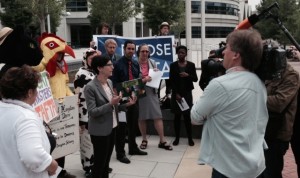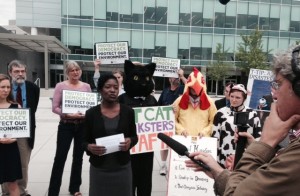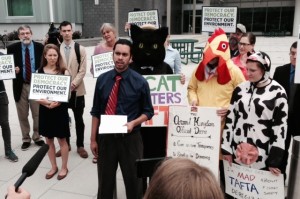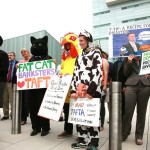A wide range of consumer, family farm, environmental, Internet freedom, labor and other organizations held a press event outside the Trans-Atlantic Free Trade Agreement (TAFTA) negotiating summit in Arlington, Virginia on May 21, 2014 in order to expose the pact as more about deregulation than “trade” per se.
“Corporations on both sides of the Atlantic view TAFTA as a means to prevent and dismantle safeguards that protect the quality air we breath, the water we drink and the food we feed our children — not to mention online privacy measures, financial reforms and more,” said Gynnie Robnett, coordinator of the Coalition for Sensible Safeguards. “We can’t let this pact become a back-door means of deregulation.” The groups highlighted a number of consumer and environmental safeguards that corporations are targeting under TAFTA:
- “Everywhere we look the digital privacy rights of global citizens are under siege. TAFTA threatens to expand this threat by further entrenching the anti-consumer principles of a digital media environment of constant personal data collection and ubiquitous tracking,” said Joy Spencer, associate director of the Center for Digital Democracy.
– - “TAFTA could very well undermine the regulation of Wall Street banks, insurance companies and hedge funds,” said Ben Beachy, research director for Public Citizen’s Global Trade Watch. “While U.S. negotiators may oppose some European proposals, they still seem eager to include in TAFTA deregulatory pre-crisis rules that would conflict with our post-crisis efforts to keep banks from trading toxic derivatives or becoming ‘too big to fail,’ while empowering foreign banks to demand U.S. taxpayer compensation for the reregulation of finance.”
– - “Expect more fracking and other dirty energy if TAFTA proceeds as corporations intend it to,” said Jorge Aguilar, southern regional director of Food & Water Watch. “Countries should be coordinating on how to combat global warming and transition to sustainable energy economies, but TAFTA seems poised to do the exact opposite.”
– - “European negotiators have targeted ‘Buy Local’ public procurement in 23 cities across the United States, threatening programs that shore up local economies and family farms,” said Kathy Ozer from the National Family Farm Coalition. “Corporations on both sides of the Atlantic are also targeting food safety and consumer measures affecting everything from GMO labeling, to milk standards, to policies under the recent Food Safety Modernization Act. Knocking down progress on food safety and GMOs through TTIP further threatens food sovereignty here in the US and across the globe.”
More broadly, all groups argued that TAFTA should not include “investor-state dispute settlement” provisions that would grant over 24,000 European-owned subsidiaries operating in the U.S. the power to attack virtually any U.S. law, regulation or court decision that they view as a “barrier to trade.” They likewise warned that proposals for a “regulatory convergence” chapter could be used to delay and prevent new safeguards in the future.
“The more we learn about this agreement the more we understand why the US and the EU are holding its contents so close to the vest. It has the potential, for example, to give corporations unbridled power to sue our governments over public interest policies in private trade tribunals, and to push more trade in fossil fuels while limiting the ability of governments to create localized renewable energy systems,” said Ilana Solomon, director of the Sierra Club’s Responsible Trade Program.
“We need a new model of trade that puts communities, workers and the environment before the profits of multinational corporations.” “Corporations want TAFTA to provide them with special powers to attack safeguards that are already in place and new ones before they’re even written,” said Arthur Stamoulis, executive director of Citizens Trade Campaign.
“Couple that with the fact the U.S. negotiators have granted hundreds of corporate lobbyists access to TAFTA texts, while barring the public from reviewing them, and there’s no question that this could end up a very bad deal for America’s working families.”
In addition to speakers discussing a cross-section of the safeguards threatened by TAFTA, the event also featured street theater with activists dressed as a “Mad Cow” and “Chlorinated Chicken” to highlight TAFTA’s threats to food safety.
Groups that participated included the Center for Digital Democracy, Center for Food Safety, Citizens Trade Campaign, Coalition for Sensible Safeguards, Food & Water Watch, Friends of the Earth US, Institute for Agriculture and Trade Policy, International Brotherhood of Boilermakers, National Family Farm Coalition, PopularResistance.org, Public Citizen’s Global Trade Watch, Sierra Club, Trans Atlantic Consumer Dialogue and others.
Ilana Solomon of the Sierra Club (below) 
Joy Spencer of the Center for Digital Democracy (below)
Jorge Aguilar of Food & Water Watch (below)
Additional photos below courtesy of Ted Majdosz. More of his great photos from the event online here.
- Mad cow mad about TAFTA food safety deregulation
- Expose TAFTA press event
- European media turned out in force
- Joy Spencer of the Center for Digital Democracy
- Fat cat banksters love TAFTA financial deregulation











